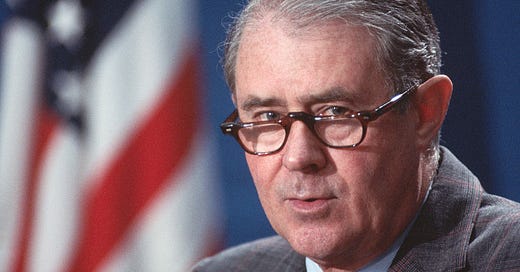Election Countdown, 225 Days to Go: NBC News and the McDaniel Mistake.
There are people who stand on principle and take the consequences. And others who bend with the wind, whichever way it blows. The news business doesn't need any more people from the second group.
Cyrus Vance during his tenure of US Secretary of State under Jimmy Carter, which ended suddenly with Vance’s resignation in protest of a major policy decision. The example of Vance and people like him deserves more attention, when the news is flooded with opposite illustrations. (Photo: Wally McNamee, via Getty Images.)
As is no secret, NBC News made a bad mistake in hiring the former head of the Republican National Committee, Ronna Romney McDaniel, for its election-year news team. Here’s why their error matters, and why viewers should respect the NBC staffers who are speaking up to object.
1) The backstory: Politics and the press.
The flow back and forth between politics and journalism is much older than you might think. These days we have George Stephanopoulos, Jen Psaki, Peggy Noonan. But centuries ago Alexander Hamilton wrote articles, many under pseudonyms, attacking critics and praising his own views. In the 1950s, Emmet John Hughes was a reporter and editor before and after his time as a speechwriter for Dwight Eisenhower. In the 1970s Jerald terHorst was Gerald Ford’s first White House press secretary while on “leave of absence” from The Detroit News. The list of examples is long.1
So a media company hiring someone from politics is not new and is not necessarily bad. But let’s look further at the circumstances.
2) The instructive case of Cyrus Vance.
The name “Cyrus Vance” is now mainly associated with Cyrus Vance Jr., who was Alvin Bragg’s predecessor as New York District Attorney.
Decades ago the original Cyrus Vance was a foreign-policy luminary. In 1977 this Cyrus Vance became Jimmy Carter’s first secretary of state. On taking office he was in his late 50s, roughly the age of Antony Blinken when beginning the same job.
After three years of service, on April 21, 1980, Vance privately gave Carter his resignation letter, in protest of Carter’s approval of a high-risk military rescue effort for US hostages in Tehran. Vance tendered his resignation after the “Go” decision had been made but four days before the mission started (and ended in catastrophe). That is, he resigned in disagreement with the decision itself, before knowing whether the raid would succeed or fail. To avoid compromising the mission, he and Carter both kept his decision secret until after “Operation Eagle Claw” happened and Carter had to go on TV and take responsibility for its humiliating failure.
On Vance’s part, this was mensch-hood of a kind rarely seen in public life. The closest parallels I can think of from the past 50-plus years, involving resignations-on-principle, are those of Elliot Richardson and William Ruckelshaus in 1973, when they defied Richard Nixon’s order to carry out the “Saturday Night Massacre.”2
Why do these examples stand out? For one thing, because these people—Vance, Richardson, Ruckelshaus—were giving up a lot in career terms. They were leaving important jobs, while still in their professional prime. Richardson was in his early 50s at the time; Ruckelshaus, his early 40s. Compare this with Mitch McConnell, at age 82 and in declining health, subserviently endorsing Donald Trump once again.
Also, none of these people pussy-footed about their reasons—“spend more time with the family”—or waited to speak until they’d found a corporate or think-tank safety net. Nor did they save their criticisms until their boss was out of power, or until they had a big contract for an “insider” book. They disagreed; they said so forthrightly and publicly; they took the consequences.
Let’s think of that as a benchmark for now.
3) ‘Exit, Voice, Loyalty’ as a concept.
The choice these people faced—“work from within,” versus “criticize from outside”—is as old as governmental power, or corporate or even family life. The classic academic formulation of the dilemma is Albert O. Hirschman’s Exit, Voice, and Loyalty, published in 1970. I wrote about the book here back in 2012, when Hirschman died at age 97.
These were choices that Robert McNamara faced by the mid-1960s, after realizing that the Vietnam war could not be won. They were the choices that Trump-era appointees like James Mattis, Rex Tillerson, H.R. McMaster, Gary Cohn, or Deborah Birx faced in deciding whether to work for him.3 Would the world be better off for their presence, because of the even-worse things they kept Trump from doing? Or did their participation leave them forever stained?
You can have genuine Hirschman-style discussions about all these people’s choices. But I don’t think you can offer any defense other than fear and weakness for the abject submission to Trump by Senators, Representatives, Governors, and most other elected figures in the modern Republican party.
We keep hearing and reading that “in private” they mock or despise Trump. What matters for public figures is what they do in public, and these Vichy Republicans slink, smile, bite their tongues, and then bow down. We don’t need to hear from more of them on the news.
4) Where Ronna Romney McDaniel fits in this scheme.
As head of the Republican Party through Donald Trump’s time in office and his years of election-denialism since then, Ronna McDaniel was as eagerly compliant as Tim Scott or Lindsey Graham. In some ways even more so.4




